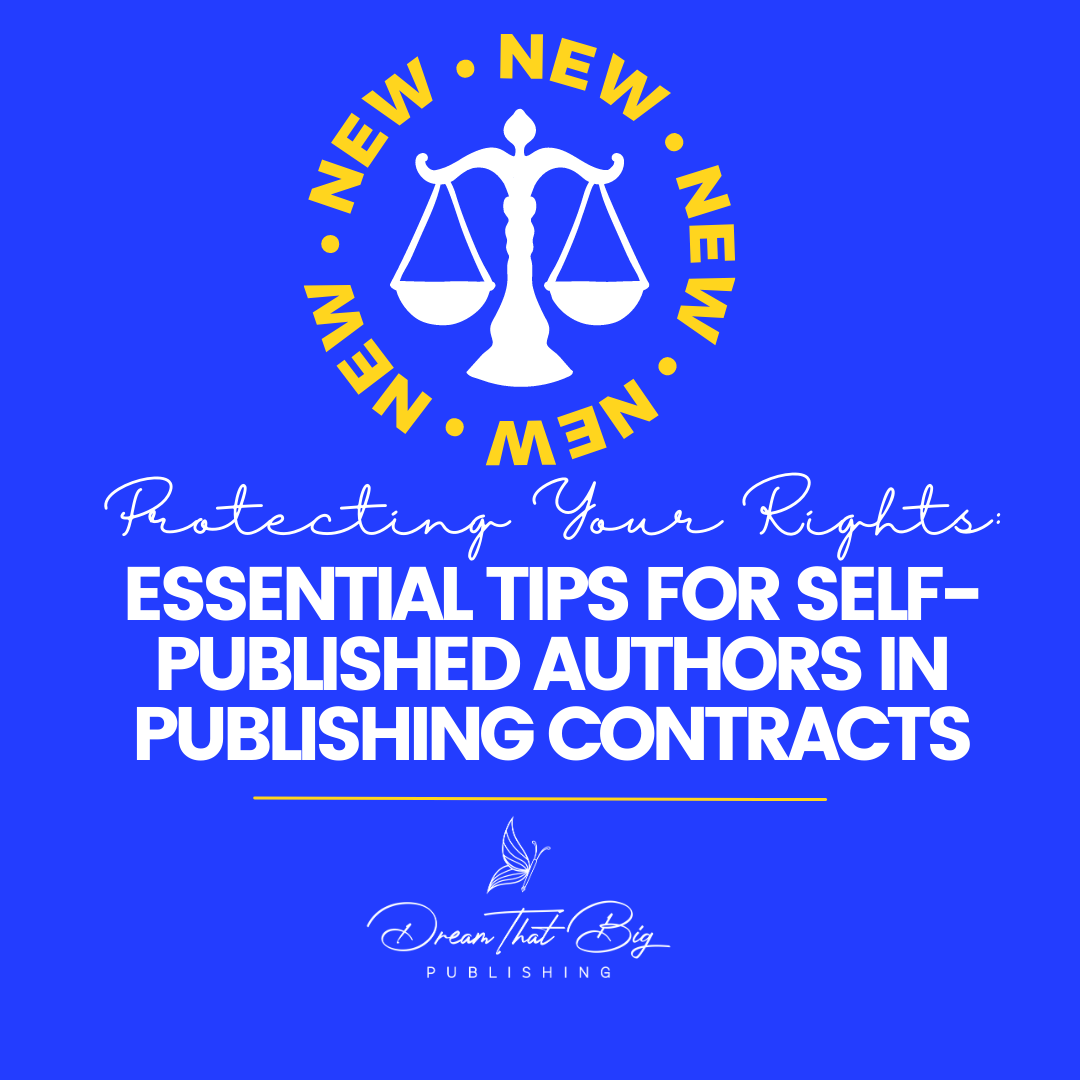For aspiring authors venturing into self-publishing, understanding the intricacies of publishing contracts is of paramount importance. A well-negotiated contract can make a significant difference in the success and financial well-being of an author’s journey. In this blog, we will delve into the significance of authors reading, questioning, and comprehending publishing contracts, highlighting key aspects to look out for, common mistakes authors tend to overlook, and strategies to avoid falling victim to scams. So, if you’re a first-time self-publishing author considering working with a hybrid publishing company, this article is tailor-made for you.
What is a publishing contract?
A publishing contract is a legally binding agreement between an author (or creator) and a publisher that outlines the terms and conditions for the publication and distribution of a written work. It is a crucial document that governs the relationship and responsibilities of both parties involved in the publishing process.
A publishing contract typically covers various aspects of the publication, including:
- Rights: The contract specifies the rights granted by the author to the publisher. These rights may include the exclusive right to publish, distribute, and sell the work in specific formats or territories.
- Manuscript Delivery: The contract outlines the author’s obligation to deliver the completed manuscript to the publisher by a specific date or within a certain timeframe. It may also include provisions for revisions or editing.
- Editing and Proofreading: The contract may address the publisher’s responsibility to edit, proofread, and prepare the manuscript for publication. It may define the extent of editing, whether it includes substantive editing or only copyediting and proofreading.
- Publication Schedule: The contract may include a timeline or publication schedule that outlines the expected release date of the book or other published work.
- Royalties and Advances: The contract specifies the financial terms of the agreement, including the royalty rates that the author will receive on sales of the book. It may also outline any advance payment that the author will receive before publication, which is typically deducted from future royalties.
- Copyright and Ownership: The contract addresses the issue of copyright ownership. Usually, the author retains the copyright to the work while granting the publisher certain rights for a specified period.
- Marketing and Promotion: The contract may include provisions for the publisher’s responsibilities regarding marketing, promotion, and distribution of the work. This may involve activities such as advertising, book tours, online promotion, and placement in retail outlets.
- Termination: The contract may outline the conditions under which either party can terminate the agreement, such as breach of contract or failure to meet obligations.
The importance of reading and understanding publishing contracts cannot be overstated. These agreements serve as a crucial means of protecting an author’s rights and interests. By thoroughly reviewing the terms and conditions of a contract, authors can ensure that their intellectual property rights, royalties, and creative control are adequately safeguarded. This careful scrutiny allows authors to make informed decisions and negotiate fair deals that align with their goals and expectations.
One of the key aspects covered in publishing contracts is the financial considerations. These contracts outline various financial aspects, such as advance payments, royalty rates, and distribution rights. By gaining a comprehensive understanding of these clauses, authors can make informed decisions about their financial arrangements. They can assess whether the offered advance is reasonable, negotiate fair royalty rates that reflect the value of their work, and ensure they retain appropriate control over the distribution and sales of their books. By delving into the financial details of the contract, authors can protect their financial interests and secure a favorable arrangement that supports their creative endeavors.
Another critical aspect of publishing contracts is the ownership and copyright provisions. These clauses define who holds the intellectual property rights to the work and outline the scope of copyright, subsidiary rights, and licensing agreements. Authors must carefully evaluate these provisions to retain control over their work and explore potential opportunities for further exploitation. By understanding the intricacies of ownership and copyright, authors can navigate the complexities of the publishing industry and make informed decisions about licensing their work for adaptations, translations, or other derivative projects. This knowledge empowers authors to make strategic choices and maximize the commercial potential of their creations.
By being well-versed in the terms and conditions of these contracts, authors can ensure their creative endeavors are supported, their interests are safeguarded, and their work has the best chance of success in the competitive world of publishing.
What are the most common mistakes authors make when reviewing a publishing contract?
Navigating contracts can be an overwhelming experience, especially for individuals without a legal or business background. The length and complexity of the language often leave first-time authors feeling lost and tempted to blindly trust the terms presented to them, assuming that they are in their best interest. However, relying solely on this assumption can be detrimental, as being overwhelmed provides no legal protection or defense.
Understanding the business side of publishing is absolutely crucial for authors. It is imperative that they take the necessary time to thoroughly review every contract, conduct thorough research, and ask pertinent questions in order to gain a comprehensive understanding of the terms and their implications.
Contracts play a pivotal role in protecting an author’s rights, ensuring fair compensation, and establishing clear expectations between all parties involved. By actively engaging in the contractual process and seeking clarity, authors empower themselves to make informed decisions and safeguard their own interests.
Moreover, recognizing the significance of contract comprehension allows authors to negotiate terms that better align with their goals and aspirations. This not only grants them greater control over their work but also ensures they receive the recognition and compensation they deserve.
Rather than succumbing to the overwhelming nature of contracts, authors should embrace the opportunity to delve into the business side of publishing. By investing time and effort in reviewing, researching, questioning, and ultimately understanding the terms presented to them, authors can protect themselves legally and make informed decisions that contribute to their success in the publishing industry.
We have curated some common oversights authors make when reviewing contracts for your benefit:
- Lack of Attention to Fine Print: Authors often overlook the fine print, which may contain crucial details such as reversion clauses, dispute resolution mechanisms, or changes in terms over time. Diligently reviewing every aspect of the contract ensures a clear understanding of all obligations and rights.
- Incomplete Understanding of Contract Language: Contracts can be laden with legal jargon that may be unfamiliar to authors. Take the time to research and comprehend the terminology used, or seek professional guidance to avoid misunderstandings or unforeseen consequences.
- Failure to Seek Legal Advice: Don’t underestimate the complexity of publishing contracts. Consulting with a publishing attorney or an experienced literary agent can help you navigate the intricacies and negotiate better terms.
- Rushing the Process: Take your time to review the contract. Don’t succumb to pressure from publishers who impose tight deadlines. Remember, signing a contract without fully understanding it can have long-term consequences.
- Lack of Research: Before signing with a hybrid publishing company, thoroughly research their reputation, track record, and reviews from other authors. Watch out for red flags like exorbitant upfront fees or unrealistic promises.
- Not Comparing Options: Don’t settle for the first offer that comes your way. Explore multiple publishing options and compare their contracts, royalty rates, and marketing strategies. This will give you a broader perspective and help you make an informed decision.
- Ignoring Red Flags: Be cautious of publishers demanding exorbitant upfront fees, promising unrealistic sales figures, or requesting an indefinite commitment without reasonable termination clauses. Reputable hybrid publishers should have transparent business models and fair contractual terms.
The cost of not thoroughly reading, and reviewing your publishing contract:
Ignorance comes at a high price. As an author, it is absolutely imperative that you not only read but also fully comprehend your contract. The consequences of failing to do so can be financially detrimental, leading to loss of earnings, relinquishment of creative rights, missed opportunities for future growth, and a host of other unfavorable outcomes that you simply cannot afford.
Let’s consider an author who decides to self-publish their book through an online platform without carefully reviewing the terms and conditions of the publishing agreement. They may not realize that the agreement includes a clause granting the platform exclusive rights to their work for an extended period.
Consequences:
- Loss of publishing options: By granting exclusive rights to the platform, the author may be restricted from publishing their book elsewhere or exploring traditional publishing avenues during the specified period. This can limit their opportunities for broader exposure and potential partnerships with established publishers.
- Limited control over pricing and royalties: The self-published author may not have noticed provisions in the agreement that allow the platform to set the pricing and royalty rates for their book. As a result, they could find themselves receiving lower royalties than anticipated or having less control over the book’s pricing, potentially affecting their earnings.
- Difficulty with rights reversion: If the author wishes to terminate their agreement early or regain control over their work after the exclusive period, they might encounter obstacles due to not understanding the specific terms for rights reversion. This can lead to frustration and hinder the author’s ability to explore other publishing options in the future.
Self-published authors, protecting your rights and interests should be a top priority when entering into publishing contracts. Thoroughly reviewing, understanding, and questioning the terms of these agreements is essential for safeguarding their creative works and ensuring fair compensation. By investing the time and effort into contract comprehension, authors empower themselves to negotiate favorable terms, retain control over their work, and maximize their potential for success in the publishing industry. Remember, an informed author is an empowered author, capable of making sound decisions and navigating the complexities of the publishing world with confidence. So, take charge of your publishing journey, protect your rights, and embark on a path that leads to the fulfillment of your literary aspirations.
The other good news is that you don’t have to be alone on this book-writing journey. Dream That Big Publishing can help you in every stage of the writing and publishing process. Contact us today to find out more. We also host monthly events both in person and virtually, and we have a Facebook community to provide you with support when you get stuck. The resources are limitless with Dream That Big!
About Dream That Big Publishing:
At Dream That Big Publishing, we offer a variety of writing and publishing services that will help you every step of the way on your self-publishing journey. Sign up to work one-on-one with a writing coach, read our blog, and listen to our podcasts. We want to empower you to write the book you’ve always dreamed of sharing with the world. Join us for networking and empowerment events that are designed to help you prosper as an author and entrepreneur, aka “authorpreneur.” We also have publishing packages that offer everything you will need, from editing to formatting to marketing your book, so you don’t have to do it all yourself!
Dream That Big published authors keep 100% of their royalties have a book they are proud of, and have joined a nurturing community that is invested in their success. If you feel that our complete nurturing system is the right fit for your authorpreneur journey, please click here to get started!
-Octoryia Robinson
Facebook
Twitter
LinkedIn

